- Home
- Jack Kerouac
Maggie Cassidy Page 6
Maggie Cassidy Read online
Page 6
Heirs leap screeching from doctors’ laps while the old and the poor die on, and who’s to bend over their bed and comfort.
“Oh I have to go to track in a minute—”
“Hey can I go see you Saturday night against Worcester?—of course I’m coming anyhow, I’m only asking your permission so you’ll talk to me.”
O Wounded Wolfe! (That’s what I thought I was, with the reading of a few books later)—At night I closed my eyes and saw my bones threading the mud of my grave. My eyelashes like an old maid being her most carefully concealed false: “Oh you’re coming to a meet?—I bet I’ll fall at the start and you wont think I can run.”
“Oh dont worry I read about it in the papers, bigshot.” Poking me—pinching me—“I’ll be watching yerr, hey—” Then suddenly sadly getting to her girlish point, “I been missin ya.”
“I been missin you.”
“How could you!—not with Maggie Cassidy ya havent!”
“Do you know her?”
“No.”
“Then how can you say that.”
“Oh, I got spies. Not that I care. You know I go with Jimmy McGuire lately. Oh he’s nice. Hey you’d like him. He’d make a nice friend for you. He reminds me of you. That nice kid you know, your friend from Pawtucketville . . . Lousy?—a little bit like him too. You all have the same eyes. But Jimmy’s Irish, like me.”
I’d stand like a precious being, listening.
“So I get along all right dont you worry I wont knit socks over you . . . hey did you hear me sing at the rehearsal for the Paint n Powder show? Know what I sang?”
“What?”
“Remember the night last December we went skating, that pond of yours out by Dracut and comin home in the freezing night with the moon and the frost you kissed me?”
“Heart and Soul.”
“That’s what I’m goin to sing—” Corridors of time stretched ahead of her, songs, sadnesses, some day she’d sing for Artie Shaw, some day little gangs of colored people would gather around her microphone in Roseland Ballroom and call her the white Billy—the roommates of her hard-knock singing days would go on to be movie stars—Now at sixteen she sang Heart and Soul and had little affairs with bashful sentimental boys of Lowell and pushed them and said “Hey”. . . .
“I’ll get you back Mr. Duluoz not that I want you but you’ll come crawling, that Maggie Cassidy’s only trying to take you away from me to get into the act she wants to have a high school football and track all around athlete if she cant come to high school herself because she was too dumb to graduate from Junior Hi—Hey Pauline Cole is that nice!” She pushed me, then pulled me to her. “This is the last time I’ll meet you under our clock.” It was a big boxlike clock hanging from the wall of the school, donated by some old class when the yellowbricks were new—we’d had our first trembling meetings under it—When she sang Heart and Soul in the cold night snow of fields it was the melting of our hearts we thought forever—The clock was our big symbol.
“Well I’ll see you some time.”
“Not under this clock, kid.”
I’d walk home alone, two hours to kill before track practice, up Moody in the wake of all the others long home and already changed for backlot yellings; Iddyboy had led the parade a long time ago with his books and eager eediboy stride (“How there boy?”)—old drunks in the Silver Star and other Moody saloons watching the parade of kids—Now it was two—sad walk up through the slums, up the hill, over the bridge into the bright keen cottages and hills of Pawtucketville, perdu, perdu. Far on the Rosemont basin were the afternoon skaters in their blue; over their heads the dreams of clouds long sobbed for and lost.
I climbed the stairs to my home on the fourth floor over the Textile Lunch—nobody in, gray dismal light filtering through the curtains—In gloom I take out my Ritz crackers peanut butter and milk from the pantry with its neat newspaper lining—no housewife of the Plastic Fifties had less dust—Then, kitchen table, the light from the north window, gloom views of grief-stricken birch on hills beyond the white raw roofs—my chess set and book. The book from the library; Scotch Gambit, Queen’s Gambit, scholarly treatises on the combination of openings, the glistening chess pieces palpable to dramatize defeats—It was how I’d become interested in old classical-looking library books, tomes, chess critiques some of them falling apart and from the darkest shelf in the Lowell Public Library, found there by me in my overshoes at closing time—
I pondered a problem.
The green electric clock in the family since 1933 traveled its poor purring little second-hand around and around the elevated yellow numbers and dots—the paint chipping was leaving them half black, half lost—time herself rolling electrically or otherwise was eating at paints, dust slowly gathering on the hour-hand, in the works inside, in the corners of the Duluoz closets—The second-hand kisses the minute-hand sixty times an hour 24 hours a day and still we swallow in hope of life.
Maggie was far away from my thoughts, it was my rest hour—I went to the windows, looked out; looked in the mirror; sad pantomimes, faces; lay in the bed, everything unutterably gloomy, yawning, slow to come—when it would come I wouldnt know the difference. In the bleak, birds squeak. I flexed my current muscles at the mirror’s flat unbending blind blare—On the radio dull booming statics half obliterated lowly songs of the time—Down on Gardner Street old Monsieur Gagnon spat and walked on—The vultures were feeding on all our chimneys, tempus. I stopped at the phosphorescent crucifix of Jesus and inwardly prayed to sorrow and suffer as He and so be saved. Then I walked downtown again to track, nothing gained.
The high school street was empty. A late winter afternoon pinkbleak light had fallen over it now, it had been reflected in Pauline’s sad eyes—Sagging old snowbanks, a black tree, weak sister sun on the side of an old building—the keen speechless winter blue beginning to appear over eastern eve roofs as the western ones pulse to the rose of distant dayfire dimming off the low cloudbanks. The last clerk’s stacking sales slips in Bon Marche’s. Dusk bird bulleted to his darknesses. I hurried to the indoor track, where the runners drummed on boards in a dark inside tragedy of their own. Coach Joe Garrity stood bleakly clocking his new 600-yard hope who in gladiator doom pumped and pulled elastic legs to expectation. Little kids threw final meaningless socks at the farthest baskets as Joe hollered to clear the gym, echoing. I ran into the lockers to jump into my track shorts and tightfitting slipper sneakers. The gun barked the first 30-yard heat, the runners shot from tilted fingertips and dug the planks away to go. I made preliminary warm-up runs around hollow clamoring board banks. Cold, goosepimples on my arms, dust in the dumb gym.
“All right Jack,” said Coach Garrity in his low calm voice, carrying across the planks like a mesmerist’s, “let’s see you try that new arm motion—I think that’s been stoppin you for sure.”
In inconceivable goofiness of my own mad mind I’d been for almost a month imitating the way Jimmy Dibbick ran, he was a distance runner, none too good, but had a way of pulling himself as he ran, hands far out fingertips stretched pointing pull-pumping like that into air reaching—a screwy style that I imitated just for fun; however in the dash, in which I was Number One man on the team beating at that time even Johnny Kazarakis who in another year beat everybody in the Eastern high schools of the United States but wasnt developed yet—the reach style was bad for my dash, I usually made 3.8 seconds in the 30, now I was retarded to 4 flat and getting beat by all kinds of kids like Louis Morin who was fifteen years old and wasnt even on the team yet just wore tennis sneakers of his own—“Run like you used to do,” said Joe, “forget your arms, just run, think of your feet, run, go,—whatsamatter you got woman troubles?” he grinned cheerlessly but with a wise humor gained from the fact that he lived no life of recognition and ease, the best track coach in Massachusetts he nevertheless worked at some desk job all day in City Hall and had a h
andful of responsibility small-paying him. “Come on Jack, run—you’re my only sprinter this year.”
In the low hurdles among these kids I couldn’t beat, I flew ahead; in Boston Garden roaring with all the high schools of New England I ran meek thirds behind longlegged ghosts two of them from Newton and everybody from Brockton, from Peabody, Framingham, Quincy and Weymouth, from Somerville, Waltham, Maiden, Lynn, Chelsea—from the bird, endless.
I got down on the line with a group of others, spat on the planks, dug my sneakers in, balanced, trembling, shot off expecting Joe’s gun and had to walk back sheepish—Now he held the gun up, we teetered, wondered, aimed eyes down the boards—BRAM! Off we go, I kick myself out with my right arm I let the arms pump themselves crosswise over my chest and run headlong falling for the line furious. They clock me in 3.7, I win by two yards blamming into the big mat against the finish line wall, glad.
“There,” says Joe, “didja ever hit 3.7 before?”
“No!”
“They musta made a mistake timing. But you got it now, pump those arms natural. All right! Hurdles!”
We put up the low hurdles, wood, some of them need new nails. We line up, blam, off we go—I’ve got every step figured, by the time we reach the first hurdle my left leg is ready to go over, I do so, slapping it down fast on the other side, stepping, the right leg horizontal folded to fly, arms swinging the move. Between first and second hurdles I jump and sprint and stretch and bound the necessary five strides and go over again, this time alone, the others are behind—I go down to the tape 35 yards two hurdles in 4.7.
The 300 was my nemesis; it meant running as fast as I could for almost a minute—39 seconds or so—a terrible grueling grind of legs, bone, muscle, wind and flailing poor legs lungs—it also meant gnashing smashing bumps with the others around the first turn, sometimes a guy’d go flying off the bank flat on his ass on the floor full of slivers it was so rough, foaming-at-the-mouth Emil Ladeau used to give me huge whomps on the first bank and especially the last when panting sickfaced we stretched that last twenty yards to die at the tape—I’d beat Emil but I told Joe I didnt want to run that thing any more—he conceded to my sensitivity but insisted I run in the 300-yard relays (with Melis, Mickey McNeal, Kazarakis)—we had the best 300-yard relay in the state and even beat St. John’s Prep older collegians in the Boston finals—So every afternoon I’d have to run the bloody 300 usually in a relay race, just to the clock, against another little kid twenty yards behind me and no footballing on the banks—Sometimes girls would come and watch their boyfriends in track practice, Maggie’d never have dreamed it she was so gloomy and lost in herself.
Pretty soon it’ll be time for the 600—the 1000—broad jump—shot put—then home we go—for supper—then the phone—and Maggie’s voice. Aftersupper Lowell talking to me—“Can I come tonight?”
“I told you Wednesday.”
“That’s too far away—”
“You’re cray-zee.”
—as lonely glooms fall enfolding all the warm organic rooftops of living Lowell—
14
After the last six o’clock shot put, the ball in the fingers delicately against the neck cradled, the kick, the hop, the twist of waist, the push up and out of the ball high and far—this was fun—I’d go in to showers and re-dress to again for the third time in my busy crazy high day stride Moody Street determined, young, and wild—a mile home. In winter darkness, the Baghdad Arabian keenblue deepness of the piercing lovely January winter’s dusk—it used to tear my heart out, one stabbing soft star was in the middle of the magicalest blue, throbbing like love—I saw Maggie’s black hair in this night—In the shelves of Orion her eye shades, borrowed, gleamed a dark and proud vellum somber power brooding rich bracelets of the moon rose from our snow, and surrounded the mystery. Smoke whipped from clean chimneys of Lowell. Now at Worthen, Prince and other old milltown streets as my feet shot me past I saw the redbrick faded into something cold and rose—unspeeched—throat-choking—My father’s ghost in a gray felt hat walked the dirty snows—“Ti Jean t’en rappelle quand Papa travailla pour le Citizen?—pour L’Etoile?” (Remember when your father worked for the Citizen, for the Star?)—I hoped my father’d be home that week end—I wished he could give me advice for Maggie—and in the grim mill alleys of ink blue and lost solstice rose he moseyed shades aside moaning my name, big, shadowy, lost—I shot past the Library now brown-windowed for scholars of the winter eve, the reading room bums, the children’s library roundshelved fairytaled and sweet—the profound bloodred bricks of the old Episcopalian church, the brown lawn, the jag of snow, the sign announcing speeches—Then the Royal Theater, crazy movies, Ken Maynard, Bob Steele, the French Canadian tenements seen up side streets, the gay winter North—remnant Christmas bulbs—Then Ah the bridge, the sigh of waters, the soothe big roar low wind coming in from Chelmsford, from Dracut, from the north—the orange iron implacable dusk skies pinpointing the steeples, and roofs in a still gloom, the iron arbrous brows of old hills far off—everything engraved and glided upon the eve and that frozen still. . . . My shoes clomped the bridge boards. My nose snuffled. A long and tiresome day and far from finished.
I passed the Textile Lunch windows, saw the bent fisty eaters through steam panes, and turned smartly into my gloomy rank doorway—736 Moody Street—dank—up four flights in eternity. In.
“Bon, Ti Jean est arrivez!” my mother said.
“Bon!” my father said, he was home, there was his face peeking around the kitchen door with a big Oriental grin—At table, my mother’s loaded it with food, steamings, goodies, he’s been feasting for an hour—I rush up and kiss his sad rough face.
“By golly I got here just in time to see you run against Worcester Satty night!”
“That’s right!”
“Now you’ll have to show me what you can do boy!”
“I will!”
“Eat! Look at the spread your mother’s got here.”
“I’ll wash!”
“Hurry!”
I wash, come in combed, start eating; Pa’s peeling his apple with his scout knife. “Well, I’m all through at Andover—Might as well tell you now—They’re laying off, their rush season—I can try Rolfe’s here in Lowell—”
“Ben oui!” my mother in French. “It’s much better you stay home!”—her tearful way of arguing and always her arguments are sweet.
“Okay, okay,” laughing—“I’ll try my best. Well my little tyke, how are you my boy! Say, maybe I can get a job at McGuire’s where Nin is—Say, what’s this I hear about you going around mooning over some little Irish girl—Bet she’s a beauty, hey? Well You’re too young for that. Ha ha ha. Well dammit, I’m home again.”
“Home agin!”—Ma.
“Hey Pa I’ll play you a game of football with the board—Whattaya say?”
“I was thinking of going down to the Club and bowling a few strings—”
“Well okay, one game—and I’ll go bowl you a game!”
“It’s a deal!”—laughing, coughing on his cigar, bending quickly with huge red-faced excitement to scratch his ankle.
“Okay,” says my mother proud and flushed and lala’ing to have her old man home again, “you do that and I’ll clear the table right away and make a nice fresh pot of coffee—aye?”
And in from the joyous cold night of the North come Lousy, Billy Artaud and Iddyboy, there are big jokes and laughs, and we choose sides, toss coins, pick teams and play a game. In the windows is slow frost, the lamplights below are in a cold and lonely black but quick figures breathing fog pass swiftly beneath them to definite eager destinations—
Not knowing that I dont deserve life without praising God I sneak off from the kitchen for a quick quiet phone call in the dark parlor—calling Maggie—Her little sister Janie answers. Maggie comes to the phone with a simple tired-sounding “Hi.”
“I told you.”
“What are you doing tonight?”
“Oh nothing. I’m bored to tears. Roy and his girl are pl—that are getting married in August are playin cards. My father just left to go to work, they gave him a short call, you shoulda seen him run out the door—he forgot his railroad watch on the dresser—He’ll be hoppin mad!”
“My father’s home.”
“I’d like to meet your father sometime.”
“You’ll like him.”
“What’d you do all day?—not that it’s important . . .”
“I do the same thing every day—walk, school, walk back for a nap, walk back for track—”
“Spendin all your time talking to Pauline Cole under the clock?”
“Sometimes.” I didnt hide it or anything. “Doesnt matter.”
“Just friends, huh?”
In the way she said “huh?” I saw her whole body and lips and wanted to clup her a mad one she’d never forget.
“Hey—”
“What?”
“If you’re bored to tears I’ll come over tonight!”
“Okay.”
“But I havent got time” (surprised I was). “But I will.”
“No. You said you didnt have time.”
“Yes I do.”
“You said you dint.”
“See you in an hour.”
“Never mind . . .”
“Hah? I’ll be right over. Hey.”
To my father and friends riotously laughing in the kitchen: “Hey, I think I’ll go see . . . Maggie Cassidy . . . that girl I know . . . she . . . we just . . . have to help her brother with his homework—”

 Tristessa
Tristessa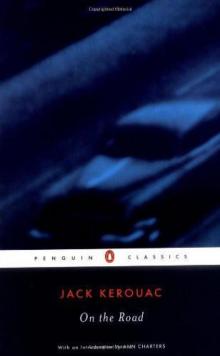 On the Road
On the Road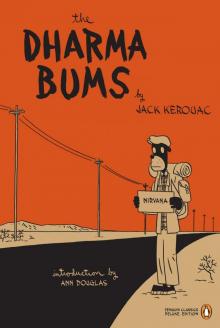 The Dharma Bums
The Dharma Bums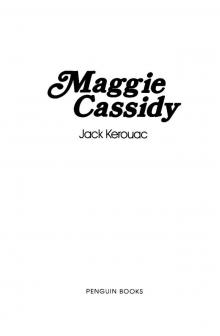 Maggie Cassidy
Maggie Cassidy Big Sur
Big Sur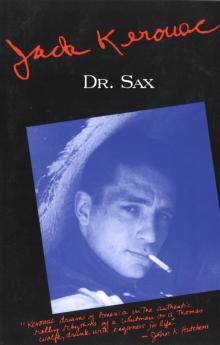 Dr. Sax
Dr. Sax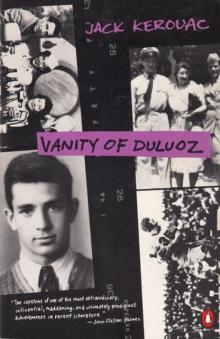 Vanity of Duluoz: An Adventurous Education, 1935-46
Vanity of Duluoz: An Adventurous Education, 1935-46 The Sea Is My Brother
The Sea Is My Brother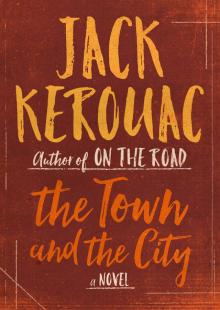 The Town and the City: A Novel
The Town and the City: A Novel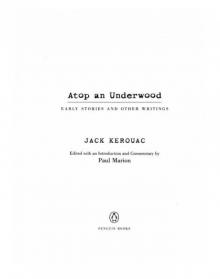 Atop an Underwood: Early Stories and Other Writings
Atop an Underwood: Early Stories and Other Writings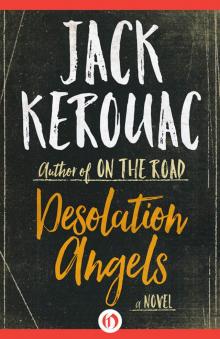 Desolation Angels: A Novel
Desolation Angels: A Novel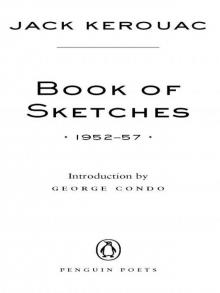 Book of Sketches
Book of Sketches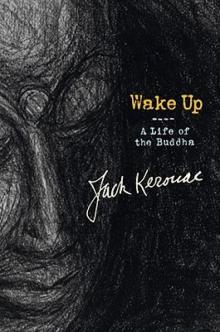 Wake Up: A Life of the Buddha
Wake Up: A Life of the Buddha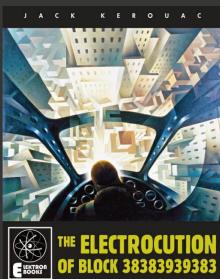 The Electrocution of Block 38383939383
The Electrocution of Block 38383939383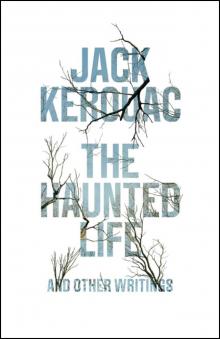 Haunted Life
Haunted Life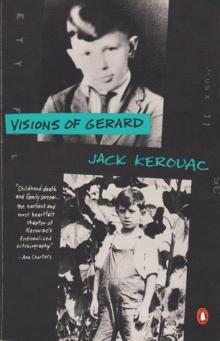 Visions of Gerard
Visions of Gerard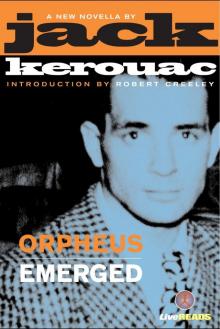 Orpheus Emerged
Orpheus Emerged Book of Blues
Book of Blues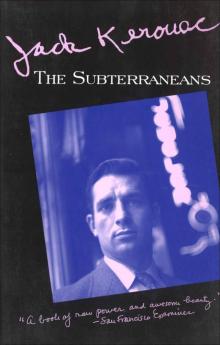 The Subterraneans
The Subterraneans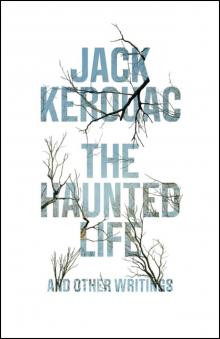 The Haunted Life
The Haunted Life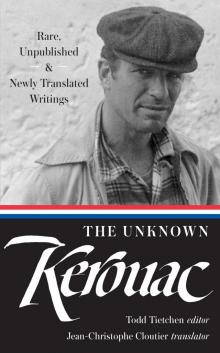 The Unknown Kerouac
The Unknown Kerouac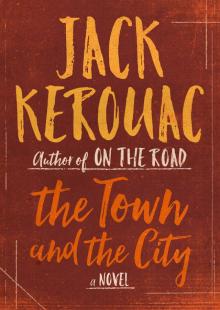 The Town and the City
The Town and the City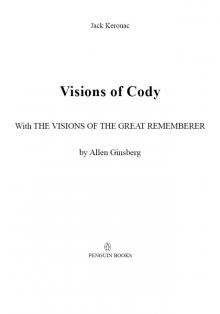 Visions of Cody
Visions of Cody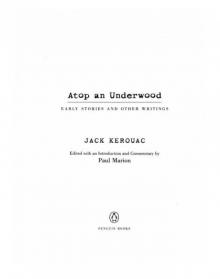 Atop an Underwood
Atop an Underwood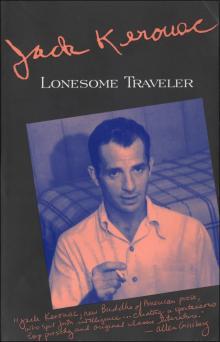 Lonesome Traveler
Lonesome Traveler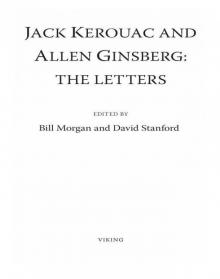 Jack Kerouac and Allen Ginsberg
Jack Kerouac and Allen Ginsberg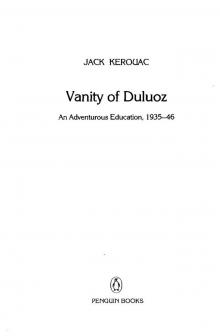 Vanity of Duluoz
Vanity of Duluoz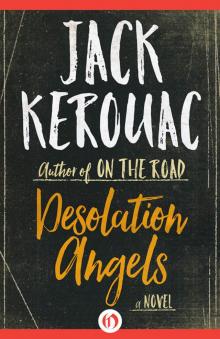 Desolation Angels
Desolation Angels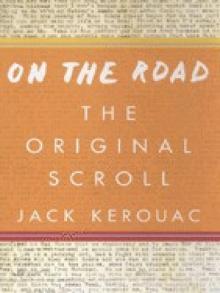 On the Road: The Original Scroll: (Penguin Classics Deluxe Edition)
On the Road: The Original Scroll: (Penguin Classics Deluxe Edition) The Sea Is My Brother: The Lost Novel
The Sea Is My Brother: The Lost Novel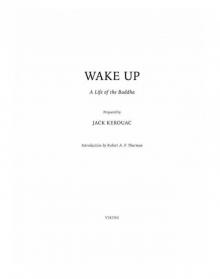 Wake Up
Wake Up The Poetry of Jack Kerouac
The Poetry of Jack Kerouac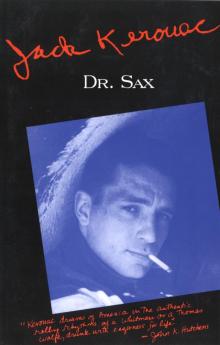 Doctor Sax
Doctor Sax